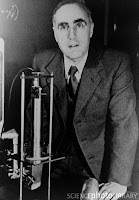After reading this AGU blog on academic genealogy, I couldn't resist weighing in with some genealogy of my own. You academic genealogy works something like a family tree, but rather than father-son relationships, it's all about who supervised who during the course of their PhDs.
So - my academic genealogy:
Firstly, a quick mention to Glenn Jones - my academic brother, now studying ice-quakes at Swansea University. We shared many a great time (and some not so great times) being supervised by Bristol big-wig Prof. Mike Kendall:
Mike, a Canadian, did his PhD at Queens University, Canada, under the supervision of Colin Thompson (now at Queens), a specialist in the nitty-gritty of modelling seismic waves. In turn, Colin did his PhD back in the UK, in my own alma mater of Cambridge, supervised by Dave Gubbins, now at Leeds:
It gets very Cambridge-centric from here on in: Gubbins also completed his PhD at Cambridge, under the supervision of one of the BIG names in geophysics, Edward Bullard:
Bullard was one of the key names during the discovery of plate tectonics. Pretty neat huh! He in turn was supervised by Patrick Maynard Stuart Blackett. Blackett spent a fair bit of time with Ernest Rutherford, who first split the atom, and is considered one of the fathers of radioactivity, and won a Nobel prize for Chemistry:
Rutherford worked under JJ Thompson, he who discovered the electron! Thompson worked under John Strutt, Lord Rayleigh, who among many other things, gives his name to Rayleigh waves (a type of seismic wave that travels along the surface of the earth (rather than through it, like P and S waves).
I'm going to speed up a bit, because there's a few names I don't really know. I've found this information from the Mathematics Genealogy website, well worth a browse if you're an academic. Rayleigh was advised by Edward Routh, and, following the biblical style (only getting older rather than younger) Routh begat William Hopkins, who begat Adam Sedgwick. We'll pause for a moment on Sedgwick:
Considered to be one of the founding fathers of the modern science of geology, Sedgwick was, among others, the tutor of Charles Darwin. The student geology society at Cambridge is named after him, as is the Cambridge Natural History museum. Onwards with our genealogy, Sedgwick begat Thomas Jones, who begat Thomas Postlethwaite, who begat Stephen Whisson, who begat Walter Taylor, who begat Robert Smith, who begat Roger Cotes. And Cotes was supervised by none other than Isaac Newton himself:
So Isaac Newton is my academic great-great-great-great-great-great-great-great-great-great-great-great-great-great-great-great-great-grandfather. That's 17 greats. So, academic great^17 - grandfather. HOW COOL! I think that blows our AGU blogger friend out of the water!
It's interesting to note the progression - we move pretty quickly from geophysics into proper, hardcore physics. There's a brief outpost of geology in Adam Sedwick, and then back to the grandfather of all modern physics, Isaac Newton. I guess that pretty much describes in a nutshell the history of geophysics as a science. It's also interesting to note how quickly everything becomes very Cambridge-centric.
While it's tempting to be proud of such an illustrious academic lineage, it's actually rather depressing. While my forbears were: inventing calculus and discovering the principles of gravitation (Newton, amongst many other things obviously); cataloging and defining the geological time periods we still use today (Sedgwick); discovering electro-magnetic scattering and a type of seismic wave (Rayleigh); discovering the electron and inventing the mass spectrometer (JJ Thompson); splitting the atom (Rutherford); discovering plate tectonics (Bullard); or just being a very cool, laid-back Canadian who looks a lot like Bruce Willis (Kendall); the sum total of my career so far is to piddle about with some aspects of hydraulic fracturing in the hope of making some incremental improvements to how we monitor and model fracks. It seems so small and parochial compared with the fabulous achievements of my forbears (and, while I'm at it, the kind of discoveries we're seeing coming out of places like CERN).
However, from my stats page it seems like someone out there at least has been reading my blog. Either it's my mother (hello mum, I promise to call again soon) or people are interested in fracking, and want to be sure that if fracking goes ahead, we're capable of monitoring it to ensure it is done safely and with minimum risk. So I guess I won't throw in the towel just yet.






It provides comprehensive knowledge of the subject. Everything written in this blog is close to satisfactory level. I am sure no one can raise any issue about all the information delivered here.เรียน a level ที่ไหนดี
ReplyDelete
ReplyDeletekanchipuram silk sarees
kanchipuram silk sarees
kanchipuram silk sarees
kanchipuram silk sarees
kanchipuram silk sarees
kanchipuram silk sarees
kanchipuram silk sarees
kanchipuram silk sarees
kanchipuram silk sarees
kanchipuram silk sarees
kanchipuram silk sarees
kanchipuram silk sarees
kanchipuram silk sarees
kanchipuram silk sarees
kanchipuram silk sarees
kanchipuram silk sarees
kanchipuram silk sarees
kanchipuram silk sarees
kanchipuram silk sarees
kanchipuram silk sarees
kanchipuram silk sarees
kanchipuram silk sarees
kanchipuram silk sarees
kanchipuram silk sarees